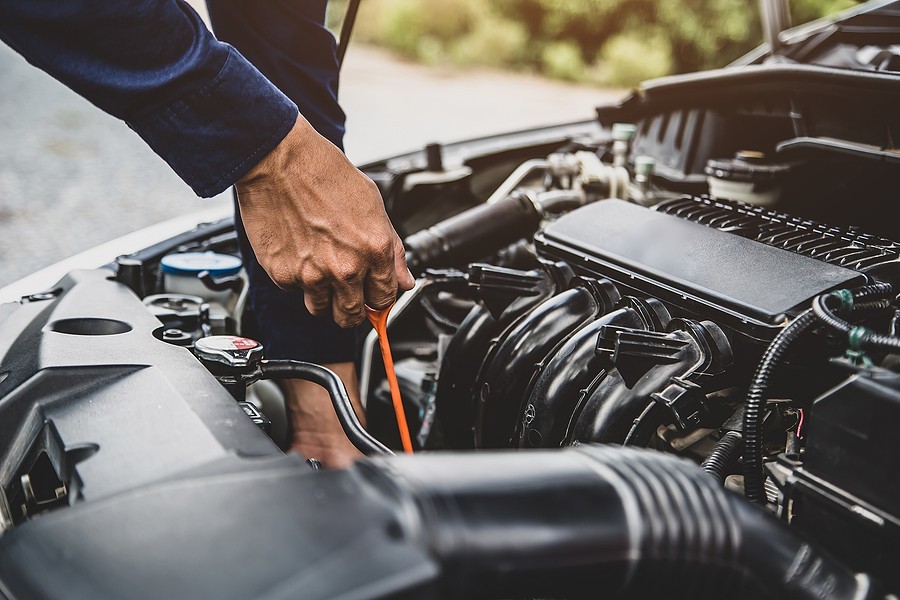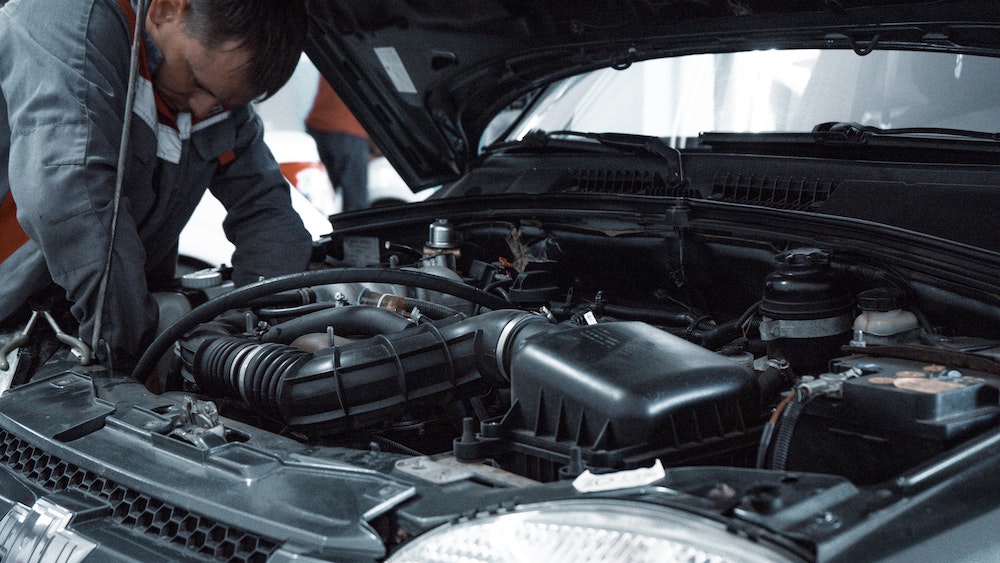Your car may sound like a tractor due to various reasons, such as an exhaust leak, damaged manifold gasket, or issues with the engine components like the catalytic converter, spark plugs, or valves.
Moreover, these problems can result in unusual noises resembling a tractor’s sound. It’s essential to have a mechanic inspect your car to identify and fix the specific issue causing the noise. Regular maintenance and prompt repairs can help keep your car running quietly and efficiently.
Reasons Behind a Car Making Tractor-Like Sounds

Muffler Problems
If your muffler is acting up, you should get it checked or replaced right away. A messed-up muffler can make your engine louder than usual. Signs include more smoke and a sudden drop in how far your car can go on a tank of gas.
Leaky Exhaust Manifold
A leak in the exhaust manifold is serious and needs fixing ASAP. Your check engine light might come on to warn you. Leaks are risky because the hot gases from your engine can damage plastic parts. Even scarier, they can let harmful stuff like carbon monoxide into your car, which can be dangerous and even deadly for passengers.
Bad Engine Bearings
Defective engine bearings are a big deal. If you hear a loud knocking sound under the hood, that’s a sign. If you let this go, it could lead to more knocking and eventually make your engine seize up. Don’t mess around with this – talk to a professional and get those bearings replaced right away.
Tire Issues
Uneven tire wear can create vibrations and noise. Check your tires for signs of uneven wear and consider rotating them to ensure even tread wear.
Wheel Bearing Failure
Failing wheel bearings can produce this problem, especially during driving. If the noise changes when turning, it could be a sign of a faulty wheel bearing.
Brake Problems
Worn brake components can cause grinding or rubbing sounds. If you hear a tractor-like noise when braking, it may be time to inspect and replace the brake pads or rotors.
Power Steering Issues
Low power steering fluid levels can cause a whining or groaning noise, especially when turning the steering wheel. Check the power steering fluid level and top it up if necessary.
Air Intake Problems
Problems with the air intake system, such as a loose or damaged air filter, can lead to unusual noises
Diagnosing and Fixing a Tractor-Like Noise in Your Car
Maintaining the key components of your vehicle is paramount to ensuring a smooth and efficient driving experience. Several crucial elements play a pivotal role in the performance and sound of your car, and addressing issues promptly is essential. Here are some components and corresponding actions you can take to keep your vehicle running smoothly:
Timing Belts:
If your timing belts show signs of wear or damage, it is imperative to replace them promptly. These belts play a critical role in synchronizing the engine’s components, and a damaged timing belt can lead to engine misalignment and performance issues.
Catalytic Converter:
Replace a clogged or damaged catalytic converter immediately. This component is integral for managing exhaust gases, and a compromised catalytic converter not only affects engine performance but can also contribute to a noisier driving experience.
Flex Plate (for Automatic Transmission):
In the case of an automatic transmission, addressing a damaged flex plate may require removing the transmission line. Swift action is necessary to repair or replace the flex plate, ensuring the proper functioning of the transmission system.
Spark Plugs:
Spark plug defects can have a negative effect on fuel combustion, which can result in engine inefficiency and unwelcome noise. Since spark plugs are commonly available and often reasonably priced, replace damaged ones as soon as possible.
Air Filters:
Regularly clean or replace clogged air filters to maintain optimal engine performance. Accumulated dust and debris can impede airflow, affecting combustion efficiency and contributing to unusual engine sounds.
Valve Mechanisms:
If the valve mechanisms show signs of wear due to prolonged use, consider replacing them. Excessive clearance in these components can be a source of the tractor-like noise. Timely replacement ensures proper engine function and reduces noise disruptions.
Estimated Repair Costs for Common Car Issues
| Repair Type | Cost Range | Description |
| Exhaust Leak Repair | $100-$500 | Repairing an exhaust leak involves addressing holes or cracks in the exhaust system, often requiring component replacement. |
| Manifold Gasket Replacement | $200-$800 | Replacing a damaged manifold gasket becomes necessary when it fails to seal the gap between the engine block and the exhaust manifold. |
| Catalytic Converter Replacement | $300-$1,500 | Replacement of a damaged or clogged catalytic converter, a crucial part of the exhaust system that reduces emissions. |
| Engine Knock Repair | $500-$2,000 | Repairing engine knock involves addressing issues like worn bearings, adjusting valve clearances, or using different oil for proper lubrication. |
| Valvetrain Noise Repair | $200-$1,000 | Repairing valvetrain noise may include tasks like replacing worn valve lifters, adjusting valve clearances, or addressing issues with the oil filter. |
Preventive Measures

- Schedule regular oil changes, tune-ups, and inspections to keep your car in optimal condition.
- Minimize driving over rough terrain to prevent damage to the exhaust system and suspension components.
- Opt for high-quality oil to protect your engine and minimize the risk of noise-related issues.
- Act promptly if you notice any unusual noises. Early detection and intervention can prevent minor issues from escalating.
FAQ’s
1. Why does my car sound loud like a truck?
Answer: The loud engine sounds may result from a damaged or failing muffler. If your car seems louder than usual without other strange sounds, a damaged muffler could be the cause.
2. Why does my car sound like a lawn mower?
Answer: The lawn mower-like sound can stem from a crack in the combustion system, where components like cylinders, spark plugs, and the exhaust are susceptible to damage.
3. Why is my car making a rumble noise?
Answer: A continuous rumbling noise at idle may be due to an improper fuel and air mixture. The accurate air-fuel ratio is crucial, and any imbalance can lead to rumbling sounds accompanied by vibrations at low speeds.
4. Why does my car sound like a diesel?
Answer: Deep knocking sounds during acceleration may indicate crankshaft to piston ring damage, often caused by the use of incorrect or counterfeit motor oil. Squealing or whining noises might be attributed to a worn-out fan belt or engine camshaft timing belt.
5. What causes a noisy engine?
Answer: Common causes of a noisy engine include worn bearings (main, rod, or thrust). Loudest under heavy load, damaged main bearings can be identified by checking the oil dipstick for metal reflections or metal shavings in the oil.
6. Why is my car very loud when I drive?
Answer: If your car is unusually loud, especially from the front, it could indicate a failing muffler. Contrary to the assumption that louder noises are engine-related, a louder running car with no other odd sounds may point to a damaged muffler.
7. Why does my car sound like a chopper?
Answer: A loose muffler in the exhaust system can cause the car to produce a loud, rumbling sound resembling that of a helicopter. A loose exhaust system may also result in decreased fuel efficiency and increased emissions.
8. What does a faulty engine sound like?
Answer: A persistent knocking or pinging noise while the engine is running can indicate a problem with the combustion process, often associated with improper fuel ignition, commonly referred to as engine knock.
Final Words
If your car sounds like a tractor, it could be attributed to several potential issues within the exhaust system or engine components. Identifying the specific cause is crucial for an effective and timely solution.
Whether it’s an exhaust leak, damaged manifold gasket, or problems with the catalytic converter, spark plugs, or valves, addressing these issues promptly through professional diagnosis and repair is essential.
Also, regular maintenance and a proactive approach to addressing unusual sounds can ensure a quieter and more reliable driving experience, preventing potential complications and ensuring the longevity of your vehicle.

